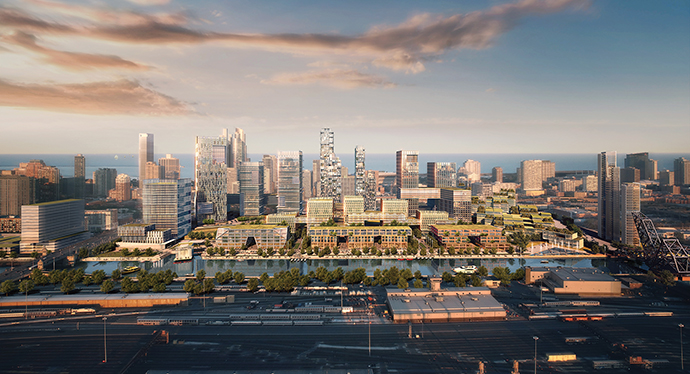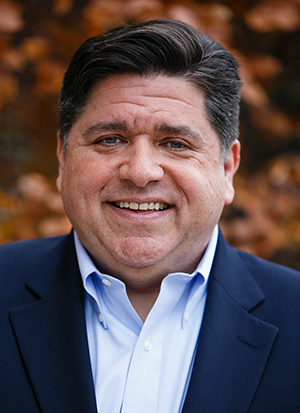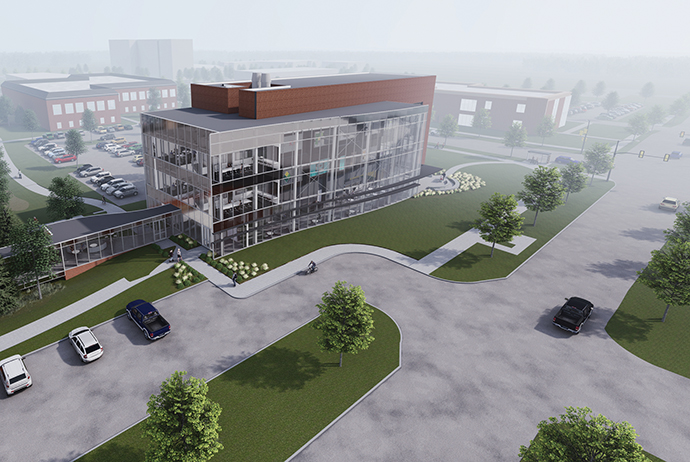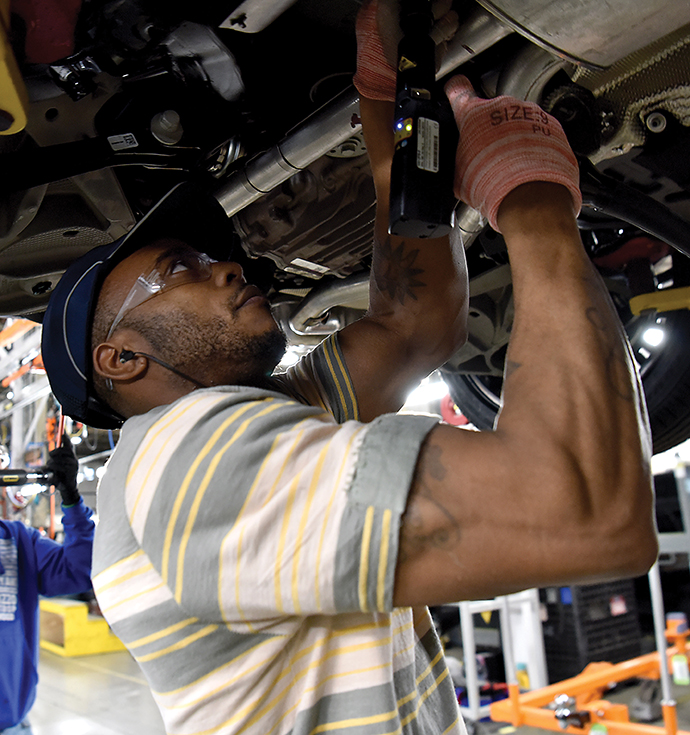If there’s one thing most business associations and chambers resist, it’s raising the minimum wage. But that’s what new Illinois Governor J.B. Pritzker just did in February.
“When your house is burning down, you don’t wait for the rain to put out the fire,” he said in his budget address just hours after signing into law a measure making Illinois the first state in the Midwest to phase in a $15 minimum wage over the next six years. The state’s current minimum wage is $8.25.
“Today is a victory for the cause of economic justice,” Pritzker said as he signed into law SB 1, which also provides small businesses and non-profits in the “collar counties” outside Chicago as well as downstate with a tax credit to ease the transition. The new law doesn’t kick in for a year, but in Pritzker’s estimation, it’s already been too many.
“It’s been nine long years since workers got a raise. And even nine years ago, the raise amounted to 25 cents an hour. For nine long years there were an array of forces lined up against giving a raise to the people who work hard to provide home care for seniors, child care for toddlers, who wash dishes at the diner and who farm our fields.”
But in addition to crediting labor organizations, he also paid heed to business leaders.
“It took years of advocacy by so many people across the state and a willingness by businesses to sit at the bargaining table to hash out a deal so that the people of Illinois wouldn’t have to wait any longer,” he said. “Businesses large and small, from local restaurants to Amazon, made it clear that hardworking employees should be fairly compensated. And even when we didn’t agree on everything, they were willing to be part of the negotiations to make the minimum wage work in our communities.”

In an interview with Site Selection that took place before the signing, Gov. Pritzker — brother to former U.S. Commerce Secretary Penny Pritzker (see our interview with her on p. 84) — addressed the wage measure first, as it was still making its way through the state legislature.
“Let me start with the fact that Chicago already has a $12 minimum wage, it’s going to $13, and businesses are thriving,” he said.
It’s part of a focus on economic inclusion and equity that is not only central to Pritzer’s plans, but, he feels, central to the values system of the talent he wants to attract to Illinois.

“We want to help people in communities left out or left behind to start businesses,” he says. “There are people of color who live in our state who have some amazing capability that is underutilized. That should be attractive to companies that Illinois is focused on equity. Let’s face it — many of the companies that have been hugely successful have been started by millennials who care about this, and want to be in a place that values equity and stands up for civil rights.
“We have the strongest laws that stand up for the LGBTQ community, great civil rights laws and now the most diverse government in the history of the state,” he continues. “We have more women in leadership positions in my governor’s office than we do men, and more women in leadership positions in my cabinet. Those are features that are very attractive for companies around the nation, and they’ll lead us to prosperity going forward.
Engineering a Talent Pipeline
In his inaugural speech, Pritzker — founder of Pritzker Group in 1996 and founder of Chicago’s legendary business incubator 1871 — said he’d be the state’s best chief marketing officer. What’s the elevator pitch from the man who’s heard his share of them?
“What businesses are looking for is great talent, and a great supply of talent over a long period of time,” he says. “Illinois has some of the most educated and experienced workers in the nation. The University of Illinois-Champaign is one of the top five engineering schools in the country, and produces more engineers than the other four of the top five every year. We have other great universities in southern Illinois and at our ‘directional” universities, not to mention Northwestern, DePaul and the University of Chicago.”
A less-touted factor is the ability to find middle management, he says, as well as skilled labor aided by currently expanding vocational training, apprenticeship programs and community college training activity.
“It’s important that our colleges, universities and community colleges are matching programs and skills development with the jobs of today and tomorrow,” says Pritzker. “We have these tremendous educational institutions that are in some ways our best assets in the state.”

He doesn’t want to see the talent those schools are producing siphoned away, and thinks there is an opportunity inherent in the desires of Illinois students, many of whom want to stay in or return to the Midwest.
“We have the greatest diaspora of engineering talent of any state in the United States, and the greatest number that return,” he says. A recent study conducted with LinkedIn showed promise. “Many of them like the lifestyle and standard of living they can have in the Midwest. It’s the best place to raise a family, and many who leave and started a family say to themselves, ‘I’d rather go home.’”
Learn & Churn
“At every level, for companies looking for talent, we’ve got it,” Pritzker says. “We also have a burgeoning technology community, both startups and later-stage companies. I founded the number one university-based incubator in the world, 1871, in 2012. Also, at the Chicago World Business Council, I was chairman of Chicago Next, the tech and entrepreneurship committee, and helped launch the incubator called Matter, for healthcare startups.”
Other accelerators and incubators include The Digital Manufacturing and Design Innovation Institute (DMDII), located in a former window factory on Goose Island in Chicago. The Institute just celebrated its fifth anniversary with the news that the Department of Defense would invest $10 million this year and at least $20 million over the next five years to promote advanced digital manufacturing R&D.
The Institute has attracted more than 300 partners, including Dow Chemical, Lockheed Martin, Rolls-Royce, Siemens, and McKinsey & Company. Since its founding in 2014, DMDII has invested approximately $90 million in more than 60 applied research projects nationwide, including work across the state at the U.S. Army’s Rock Island Arsenal, the nation’s largest government-owned weapons manufacturer, assessing the use of 3D modeling in manufacturing in order to get equipment to warfighters faster.
“Since our founding, the opportunity and urgency to lead the charge to digitize U.S. manufacturing has only grown,” said Caralynn Nowinski Collens, CEO of UI LABS, DMDII’s parent organization, when the funding was announced in February at an event attended by Gov. Pritzker.
“Manufacturing is a critical part of the Illinois economy and we must maintain America’s competitive edge,” said U.S. Senator Dick Durbin. “UI LABS helps our state and our nation achieve success on both fronts.”
Since he went into business as a venture capitalist more than 20 years ago, Gov. Pritzker has been involved in building the entrepreneurial and tech economy in the state.
“I’ve been involved in helping to create incentives for new businesses to get started — the angel tax credit for example — and promoting tech from our universities,” he says, in addition to helping create many organizations such as the Illinois Venture Capital Association, the first big tech accelerator called TechStars Chicago and the seed fund for what is now known as Chicago Ventures.
“I’ve been very involved in helping to grow the ecosystem for startups,” he says, and naturally that has involved getting to know people, places and companies around the world. Asked what he thinks of linking to one of the world’s top entrepreneurial economies in Israel, he says, “As it happens, I’ve spent a reasonable amount of time in Israel, I know the authors of ‘Startup Nation,’ and I think there are some great opportunities Israel has taken advantage of. What Israel has done is a lot of what Chicago and Illinois has done or can do. We may be located in the center of the country, and people think technology only happens on the coasts, but the reality is there is a great deal of industrial technology and financial trading technology vital to Midwestern industries.”
Compelling evidence of Chicago-Israel connectivity came in January, when Yissum, the tech transfer unit of the Hebrew University in Jerusalem, announced the opening of three centers of international cooperation in Chicago; Asunción, Paraguay; and Shenzhen, China, to facilitate regional commercialization of technologies from the university. In Chicago, Yissum will participate in the Discovery Partners Institute, led by the University of Illinois System, its three universities and other partners, with an initial focus on entrepreneurship, biosciences, computer science including AI, big data and cybersecurity, as well as food and ag technologies.
Keep it Moving
Pritzker says it’s a bit early in his tenure to be making specific trade mission plans. But traveling in state is a hot topic.
“That includes making sure we have the rail systems and interchanges in places like Decatur, and maybe bringing a port to Cairo in far southern Illinois. I’ll shortly introduce a capital bill for the state to make sure we’re maintaining our position as the supply chain hub of the nation. We have to have the capability to move goods into and out of the state. The more we can move, the better our economy does.”
Movement of data will help too, which is why internet infrastructure expansion is on his punch list too.
“We’re working with broadband providers even now, making sure we are bringing broadband across the state, to places that have a lot of incredible talent like Carbondale or Edwardsville or Peoria. We have an opportunity to attract businesses to Chicago as well as downstate Illinois, as we strengthen our internet infrastructure across the state.”
Money Talk
Governor Pritzker says his team is looking to attract business and “I’m here to talk to any business.” Chances are one of the things those companies will want to talk about is stability.
It’s been on the minds of Illinois companies and citizens for some time, as the state’s fiscal condition is among the worst in the nation and the state has been shedding population.
“From the moment I won the election in November, I’ve been working across the aisle with Republicans as well as Democrats to make sure we’re all focused on raising up the business climate in Illinois and putting us on a strong fiscal footing,” he says. “I’ve spoken three times over the last 24 hours with Republicans, and that hasn’t happened much in the last four years or even the last 20.”
Pritzker in late February unveiled his budget plan. Among its planks is something many have been championing for years: a fair tax. “A fair tax will change the arc of Illinois’ finances forever,” Pritzker said. Other facets of the plan include legalizing and regulating adult-use cannabis; legalizing and taxing sports betting; and taxing insurance companies to cover Medicaid costs. (See budget speech sidebar.)
“It took a lot of years to get into the situation we’re in,” he says, “and it will take a few to get out of it. I ran on stabilizing and fixing the challenges we face, I won on that, and I’d say we have a mandate for that. People should have faith — I’m a business person and somebody who cares deeply about the state. We will grow our economy and attract businesses as well as help working families around the state.”
“Chicago already has a $12 minimum wage, it’s going to $13, and businesses are thriving.”
But first those families have to be willing to stick around. When asked about population decrease, Pritzker immediately connects it to what he says has been the underfunding of universities over several years, and the limited amount of Monetary Award Program (MAP) grants, available to students attending qualified colleges in Illinois who demonstrate financial need, regardless of grade point average.
“When you’re a 17- or 18-year-old and thinking about whether you’re going to go to a university in Illinois that’s supposed to provide you a MAP grant — but you don’t know if you’re going to get it [due to lack of appropriated funds] — versus another university that’s positioned in another state that doesn’t seem to be unstable, you’re going to choose the stable over the unstable,” he says. “It’s very important to me that we establish the MAP grant as something not subject to partisan rancor, but stable and available to students across the state. When students get up and leave, 70 percent don’t come back, and sometimes families go with them.”
In his budget address in February, he addressed these linkages directly:
“Illinois is faced with a $3.2-billion budget deficit and a $15-billion debt from unpaid bills,” he said. “Last year alone, the state paid out more than $700 million in late payment penalties. That’s enough to cover free four-year university tuition for more than 12,000 students. We are dealing with a fundamental structural deficit that has existed for quite some time and spanned the administrations of several governors. And it won’t be solved until we rethink our spending priorities and some basic revenue issues facing the state. During a time of unprecedented economic growth across the country, we lost four valuable years because of an ideological battle. That stops now.”
Show Us Your Plans
In February, with input from more than 400 stakeholders, the Pritzker administration published 11 transition committee reports, covering such areas as growing the ag economy, restoring quality to the state’s infrastructure, addressing power generation and energy, and job creation and opportunity (view them at www2.illinois.gov/sites/gov/Pages/Transition). For that last topic, the report offered a candid self-assessment of where a state with natural competitive advantages is not necessarily realizing them:
“Illinois offers many meaningful advantages as a place to live and thrive. It is the sixth largest U.S. state by population, with 12.8 million residents, and fifth by GDP, of $800 billion. It is also the commercial center of the Midwest, with 32 Fortune 500 companies headquartered within its borders, fourth among all states. A wide range of industries, from agriculture and manufacturing to professional services and health care, have a robust presence in Illinois. Industry in Illinois benefits from a qualified workforce: 33 percent of residents have a bachelor’s degree or higher relative to the national average of 30 percent …
“Yet despite its advantages, Illinois’ economy has been underperforming: Both GDP growth, 0.5 percent per year, and labor productivity growth, 0.4 percent per year, between 2007 and 2017 lag behind national averages in the same time frame, 1.5 and 0.8 percent, respectively. There are a number of challenges that may be driving this issue. For example, Illinois has experienced the highest levels of outbound domestic migration in the U.S., particularly among young people — the state ranked 49th in millennial population growth from 2010 to 2017 at a rate of -2.3 percent. From an employment standpoint, there is a lack of qualified candidates for available roles in middle- and high-skill occupations, e.g. health care services, computer/software, firstline supervisors of service workers, truck drivers.
“In addition, young companies across the nation are some of the most important job creators. However, Illinois lags most states across the innovation funnel,” the report said, from R&D funding (35th in university R&D) to the rate of new entrepreneurs, where Illinois ranked No. 19 among large states. “Complicating the issue, Illinois is home to high economic inequality across regions and populations. It is the U.S. state with the 10th highest economic inequality.
“Path forward: A principled approach to support workers and businesses. It will take a concerted effort and a holistic approach to address the full scope of challenges and revitalize the state’s economy.”

